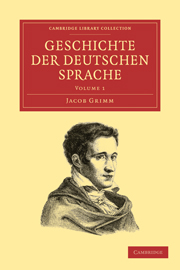Book contents
- Frontmatter
- AN GERVINUS
- VORREDE
- Contents
- I zeitalter und sprachen
- II hirten und ackerbauer
- III das vieh
- IV die falkenjagd
- V ackerbau
- VI feste und monate
- VII glaube recht sitte
- VIII einwanderung
- IX Thraker und Geten
- X Skythien
- XI urverwandschaft
- XII vocalismus
- XIII die spiration
- XIV die liquation
- XV die stummen
- XVI die lautabstufung
- XVII die lautverschiebung
- XVIII die Gothen
- XIX die Hochdeutschen
- XX die Franken
- Frontmatter
- AN GERVINUS
- VORREDE
- Contents
- I zeitalter und sprachen
- II hirten und ackerbauer
- III das vieh
- IV die falkenjagd
- V ackerbau
- VI feste und monate
- VII glaube recht sitte
- VIII einwanderung
- IX Thraker und Geten
- X Skythien
- XI urverwandschaft
- XII vocalismus
- XIII die spiration
- XIV die liquation
- XV die stummen
- XVI die lautabstufung
- XVII die lautverschiebung
- XVIII die Gothen
- XIX die Hochdeutschen
- XX die Franken
Summary
Aller laute einfache grundlage erscheinen die vocale und erst an ihnen entfaltet sich die macht der consonanten. der vocal tönt von selbst, der consonant, um deutlich vernommen zu werden, bedarf einer gemeinschaft mit dem vocal; es sind in der stimme alle ansätze zum consonantlaut da, die an den vocal gefügt klarheit erlangen. der vocal ruht, der consonant schwebt und ergreift jenen.
Wie in der sprache überall waltet auch für den vocalismus trilogie. aus drei vocalen stammen alle übrigen.
Es ist ein gewaltiger satz, den uns sanskrit und gothische sprache zur schau tragen, dass es ursprünglich nur drei kurze vocale gibt: A I U.
Auf dem verhältnis dieser drei laute beruht nicht nur ihre eigne erhaltung oder abänderung so wie die zeugung der längen und diphthonge, sondern auch bildsamkeit, flexion und wollaut aller wörter.
Wiederum ist von den drei vocalen A der edelste, gleichsam die mutter aller laute, aus dem zunächst I und U hervor-gegangen sind, so dass diese dreiheit, gleich jeder andern, auf anfängliche einheit zurückweist.
A wird mit ofnem vollem mund, I mit innerem halbem, U mit schliessendem gesprochen.
Nicht umsonst beginnt A in allen alphabeten, deren anordnung überhaupt beachtenswerth scheint; es sei hier bloss bemerkt, dass das lateinische, wie mit A anhebt, mit U schliesst (da v x y z unwesentliche jüngere zusätze), folglich I beinahe die mitte einnimmt, zwischen A und I ist E, zwischen I und U ist O geschaltet. geradeso gelangt das organ von A auf E zu I, von I auf O zu U.
- Type
- Chapter
- Information
- Geschichte der deutschen Sprache , pp. 274 - 293Publisher: Cambridge University PressPrint publication year: 2009First published in: 1848



